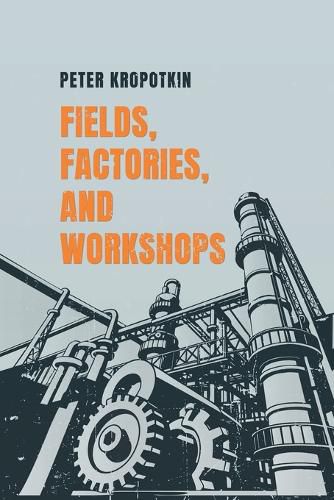Readings Newsletter
Become a Readings Member to make your shopping experience even easier.
Sign in or sign up for free!
You’re not far away from qualifying for FREE standard shipping within Australia
You’ve qualified for FREE standard shipping within Australia
The cart is loading…






This title is printed to order. This book may have been self-published. If so, we cannot guarantee the quality of the content. In the main most books will have gone through the editing process however some may not. We therefore suggest that you be aware of this before ordering this book. If in doubt check either the author or publisher’s details as we are unable to accept any returns unless they are faulty. Please contact us if you have any questions.
"Agriculture and industry must go hand in hand, each supporting and developing the other." - Peter Kropotkin, Fields, Factories, and Workshops
First published in 1899, Fields, Factories, and Workshops is one of Peter Kropotkin's most important contributions to political economy and social theory. In this work, the Russian geographer, scientist, and anarchist thinker presents a radical vision of decentralization in both agriculture and industry, advocating for small-scale, self-sufficient communities where production and labor are reorganized around cooperation rather than exploitation.
Kropotkin challenges the centralized industrial system of his day, arguing that modern science and technology could be harnessed to reduce human toil, increase efficiency, and restore the natural balance between city and countryside. His proposals highlight the importance of integrating manual and intellectual labor, cultivating local autonomy, and encouraging economic systems based on solidarity and sustainability.
A pioneering text in the history of anarchist thought, Fields, Factories, and Workshops influenced later discussions of sustainable development, environmentalism, and alternative economics. For students of history, political theory, environmental studies, and social reform, it remains a classic exploration of how human society might organize production for both justice and well-being.
$9.00 standard shipping within Australia
FREE standard shipping within Australia for orders over $100.00
Express & International shipping calculated at checkout
This title is printed to order. This book may have been self-published. If so, we cannot guarantee the quality of the content. In the main most books will have gone through the editing process however some may not. We therefore suggest that you be aware of this before ordering this book. If in doubt check either the author or publisher’s details as we are unable to accept any returns unless they are faulty. Please contact us if you have any questions.
"Agriculture and industry must go hand in hand, each supporting and developing the other." - Peter Kropotkin, Fields, Factories, and Workshops
First published in 1899, Fields, Factories, and Workshops is one of Peter Kropotkin's most important contributions to political economy and social theory. In this work, the Russian geographer, scientist, and anarchist thinker presents a radical vision of decentralization in both agriculture and industry, advocating for small-scale, self-sufficient communities where production and labor are reorganized around cooperation rather than exploitation.
Kropotkin challenges the centralized industrial system of his day, arguing that modern science and technology could be harnessed to reduce human toil, increase efficiency, and restore the natural balance between city and countryside. His proposals highlight the importance of integrating manual and intellectual labor, cultivating local autonomy, and encouraging economic systems based on solidarity and sustainability.
A pioneering text in the history of anarchist thought, Fields, Factories, and Workshops influenced later discussions of sustainable development, environmentalism, and alternative economics. For students of history, political theory, environmental studies, and social reform, it remains a classic exploration of how human society might organize production for both justice and well-being.